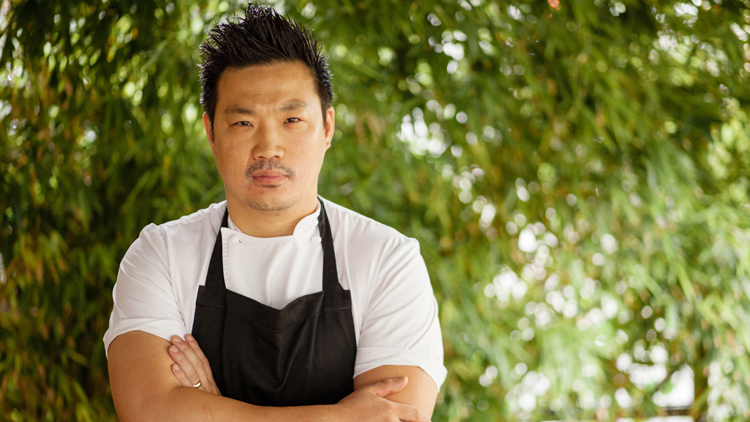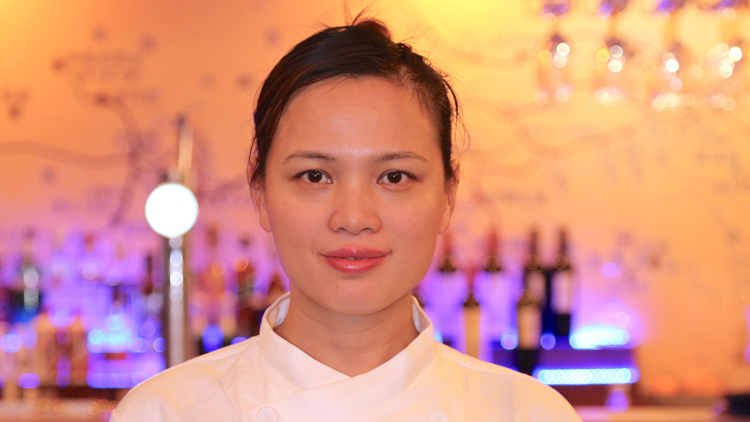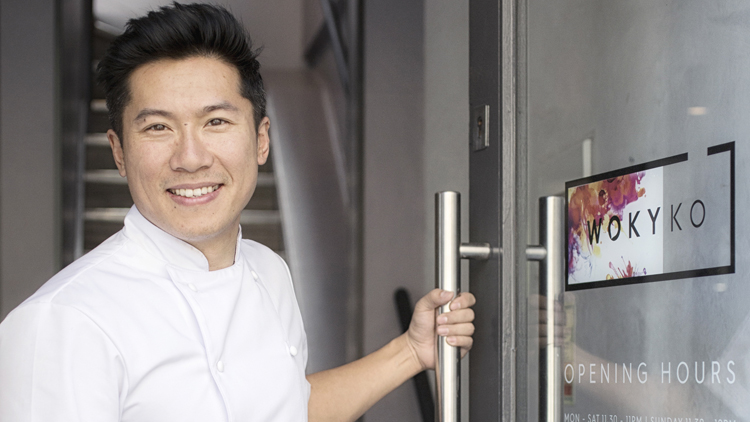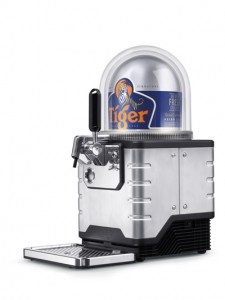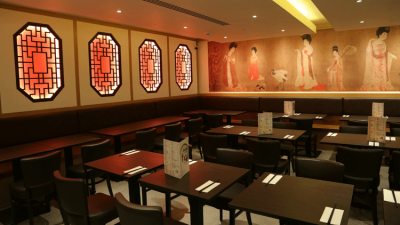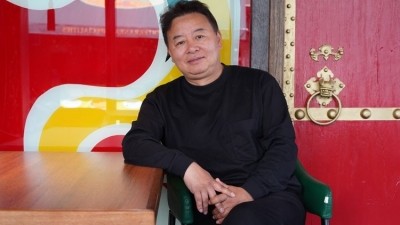Sponsored by Tiger Beer on Blade
Eight restaurateurs shaking up Chinese cuisine in the UK
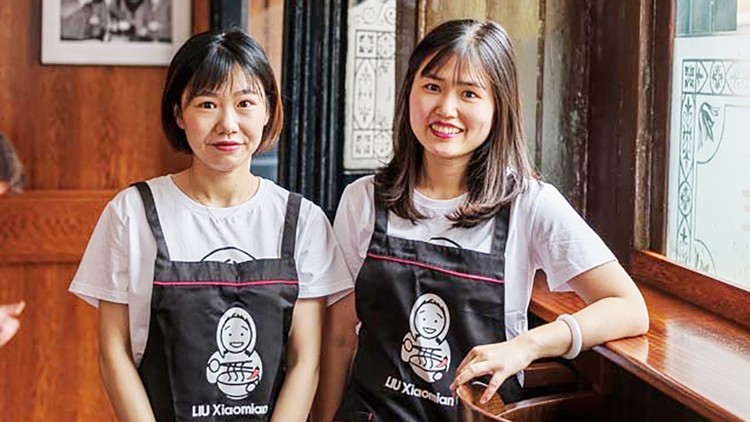
Chinese food is going through a renaissance in the UK as a new generation looks beyond the standard Anglo-Cantonese restaurant format with more focused, creative and contemporary menus.
These new wave concepts highlight the often unappreciated scope of Chinese food by focusing on a particular area of this vast country, whether that be the spicy and numbing food of Sichuan or the more delicate flavours of Shanghai.
But despite its ubiquity on these shores Cantonese food is still part of the conversation, with some chefs playing with people’s expectations of what a British Chinese restaurant should be serving by rethinking staples, slimming down menus and using better quality produce.
“People are exploring and playing with their heritage, whether that’s traditionally run-Cantonese places or lesser known Chinese cuisines,” says Andrew Wong, the Michelin-starred chef behind A Wong and Kym’s.
“People are more open to the idea of trying new things when it comes to Chinese food. And even non-Chinese chefs are adopting some Chinese techniques and flavours, incorporating them into their own menus.”
As Chinese New Year approaches, Restaurant profiles eight chefs and restaurateurs that are shaking up Chinese food in the UK, plus a further five to keep a close eye on.
Andrew Wong
It’s difficult to think of a UK chef who has done more for the image of Chinese food in recent times than Andrew Wong. Opened in 2012, his flagship restaurant A Wong showcases the intricacy and scope of Chinese cuisine in a thrilling and accessible manner.
His work at the Victoria restaurant has shined a light on the clever techniques behind many Chinese dishes and proved there is far more to it than simply flinging a few things in a wok.
The Cambridge graduate’s menus showcase a mix of the familiar – there are tweaked yet respectful versions of Anglo-Cantonese restaurant classics – with lesser known flavours and dishes from all over China, including Anhui province red braised fermented wild seabass and Shaanxi pulled lamb ‘burger’. Over the past few years, Wong has extended his reach with a consultancy project in New Delhi and a larger and marginally more casual restaurant called Kym’s in the City (see Kimberley Hernandez).
Charlene Liu and Liu Qian (pictured main)
Lu Xiaomian started out as a street food stall in 2017 but now trades from two central London pubs: The Jackalope in Marylebone and, more recently, Holborn Whippet. Accurately billed by founders Charlene Liu and Liu Qian as spicy, numbing and addictive, the noodles hail from the city of Chongqing in Sichuan province, south-west China.
Drenched in a powerful homemade chilli oil spiked with sesame, garlic and lots of ground sichuan pepper, Lu Xiaomian’s noodles are bracingly authentic and well-suited to a pub setting. The pair don’t pull any punches with their regularly changing chef’s specials either, with the likes of spicy pigs trotter noodles served with the same degree of uncompromising authenticity.
Wai Ting, Tat Chung and Erchen Chang
The trio behind the Bao mini chain arguably kickstarted the UK trend for bao buns about five years ago when they launched at Hackney’s Netil Market. Three Bao restaurants have followed, as well as the more upmarket Xu on the fringes of Chinatown. All the restaurants are a masterclass in making (generally) not well-known dishes desirable and accessible for a western audience while staying true to the source material. Siblings Wai Ting and Tat Chung grew up in the industry – their parents ran a string of Cantonese restaurants in Nottingham – while Chang is from Taiwan. The trio’s dishes are mainly Taiwanese but there is room for playfulness with plenty of influences from mainland China at Xu especially, which serves a menu that includes tomato and smoked eel, Sichuan oil and soy dried daikon; and char siu Iberico pork neck. The JKS Restaurants-backed threesome will open their largest Bao yet in King's Cross early this year.
Wei Guirong
Wei Guirong arrived in London in 2008 and worked at respected Sichaunese restaurant Barshu (see Shao Wei). In 2015, she opened Xi’an Impression with Zhang Chao in the shadow of the Emirates Stadium in Holloway. The humble, tightly-proportioned restaurant specialises in the chilli and cumin-flecked food of Guirong’s home province of Shanxi in northern China and was an instant hit despite serving up dishes that were at the time largely unknown in London.
Along with a few others including Chao and the team behind Murger Han, Guirong has opened up this relatively obscure region of China that is big on wheat-based dishes, including vinegar-heavy braised meat stuffed ‘burgers’ and – most famously – biang biang noodles. Guirong opened her first solo restaurant Master Wei early last year in Bloomsbury close to SOAS and UCL, and is expected to open another this year.
Lee Tiernan
While very far from being a Chinese restaurant, Black Axe Mangal incorporates punchy Chinese flavours into a great many of its exuberant, in-your-face dishes. A case in point is chef owner Lee Tiernan’s mapo doufu, which he serves alongside hash browns (he describes the pairing as his death row meal).
In a poetic twist, the Islington restaurant is on the site of a former Chinese takeaway. Other China-inspired dishes include pressed octopus with sichuan vinaigrette; bloodcake-fried rice; and century egg with anchovy dressing and pig skin. Tiernan isn’t the only Western chef to explore the racier end of the Chinese flavour spectrum, but nobody else is doing it quite like Black Axe Mangal.
Larkin Cen
Brought up in a Cardiff Chinese takeaway, Larkin Cen now operates a small group of inexpensive yet ambitious restaurants in Bristol under the Woky brand. Aided by a largely Western kitchen crew, Cen is big on development; perfecting dishes that play around with classic Asian flavours and dishes (his restaurants are Pan Asian but owe more to China than anywhere else).
Menus are approachable (soup noodles, bao buns, roasted meats, katsu curry) but there’s an impressive level of refinement behind each dish. Given the attention to detail, Woky offers exceptional value with a price point that’s more Wagamama than mid-market indie. Cen is eyeing further expansion this year with a restaurant in Cardiff a strong possibility.
Z He and Alex Peffly
The Guangdong province-born Z He and her English husband Alex Peffly burst onto the scene with Bun House in 2017 and followed up with pancake-focused street food stall Pleasant Lady a year or so later. Last year the pair launched Wun’s in Greek Street, a more high-end Cantonese restaurant that explores the food of her childhood that has been well-received by the critics. With a total of seven venues opened in just a few years, this prolific pair is one to keep a close eye on.
Shao Wei
Perhaps surprisingly given the wider UK’s love of Anglo-Cantonese restaurants, nobody has quite managed to create a truly national Chinese restaurant chain. Sichuanese-born restaurateur Shao Wei is looking to put that right. He has been responsible for some of London’s most critically successful Chinese restaurants including Barshu and is now aggressively rolling out his more casual BaoziInn brand. He currently operates four BaoziInn restaurants plus three food court operations, one of which – intu Lakeside – marked the group’s first location outside London. With his growth brand’s offer now tweaked to be less skills-intensive and five more sites planned for this year, he looks well-placed to fulfil his ambition.
Ones to watch
Amy Poon
The daughter of renowned Chinese chef-restaurateur Bill Poon plans to bring her family’s iconic Cantonese restaurant brand back to the capital this year. The former advertising executive launched a successful three-month pop-up back in 2018 serving up some of the dishes with which her dad made his name, including claypot rice, Hainanese chicken and Poon’s famed wind-dried meats.
Kimberley Hernandez
The appropriately named Kimberley Hernandez was named head chef at Andrew Wong’s Kym’s late last year following a brief stint at Taiwanese restaurant Xu. With a CV that includes the two-starred Matsalen in Sweden, the Philippines-born chef is working with Wong to shake up Kym’s menu with ‘fun and cheeky takes’ on classic Chinese dishes. Recent creations include a riff on prawns in golden sand made with pumpkin instead of the titular crustacean; and typhoon shelter mushrooms.
Lillian Luk
Founded in 2014 by former investment banker Lillian Luk, Shanghai Supper Club offers a regularly changing menu of Shanghainese dishes. Subtle, highly seasonal and produce-focused, it’s an area of Chinese gastronomy that has had very little exposure on these shores but – as Luk’s dishes prove – is deserving of further exploration.
Henry Yau
Chilli chicken tenders; salt and pepper potato fries; sesame prawn toast served as little soldiers for dipping in sweet and sour sauce. Under the tagline of British Chinese food, Henry Yau is looking to make the traditional Anglo-Cantonese restaurant more accessible and contemporary with his two WowYauChow restaurants in Altrincham and Rochdale. The refreshingly brief food menu is supported by a large selection of craft beers and cocktails.
Mike Mounfield and David Hughes
This Liverpool-based duo are behind Lu Ban, an upmarket Chinese restaurant in the city’s recently launched Brewery Village. Lu Ban Liverpool is one of a handful of UK restaurants to serve dishes from Tianjin, a large port city close to Beijing in north-eastern China. The pair’s executive chef Dave J Critchley is in the process of becoming the first non-Chinese Master Apprentice of Tianjin’s national level Master Chef of Chinese Culinary Arts.
The Insider
Otto Esser, head of Blade at Heineken UK
What’s behind the wider UK Asian restaurant sector’s current success?
Throughout the past few years, Asia has become a key destination for holidays and trips. This has opened up a huge number of consumers to the traditional and authentic tastes that come with this. As these consumers return to the UK, they are seeking out opportunities to revisit the authenticity that is the Asian cuisine they have grown to love.
There are a fair few Asian beer brands. What makes Tiger Beer stand out? What does it offer restaurants?
As its name suggests, Tiger Beer packs a real bite. It’s the number one beer in Asia, the UK’s most widely stocked Asian beer brand and winner of 40 international awards for quality. As a renowned premium lager, it’s a great option for operators looking to tap into the growing world lager category (+27%) on draught.
What advice would you give restaurants looking to match Asian food with drinks?
As alcohol consumption alongside food continues to grow, promoting a combined offering of draught beer and food can help operators deliver greater value to the consumer, while encouraging additional footfall and increased spend. Tiger Beer’s fruity aromatic notes are balanced with moderate bitterness to give a clean finish, making it an ideal choice to stand up to some of the sweeter Asian dishes like satay.
What's the issue with bottles? Why should restaurants consider introducing a draught beer offering?
Draught beer is the preferred choice for UK consumers, with 93% of all beer in the UK being consumed in draught format. With the average price of a pint of beer having risen by 42p over the past four years, Blade represents an important opportunity for all restaurant outlets currently restricted to offering only packaged beer to drive profitability by increasing their beer sales.
Tell us about Heineken's Blade system. How does it work?
Blade is a revolutionary 8-litre countertop draught dispense system that provides freshly tapped beer. Its small footprint and innovative compression system means draught beer can be served anywhere – all that’s required is space on a countertop and a power source. Serving beer that stays fresh for 30 days, at a precise 2°C thanks to an innovative air compression system that doesn’t require CO2, Blade guarantees a high quality pour time and time again.
Blade is a revolutionary eight-litre countertop draught dispense system that provides freshly tapped beer. Its small footprint and innovative compression system means that draught beer can be served anywhere – all that’s required is a countertop and power source. Serving beer that stays fresh for 30 days, Blade guarantees a quality pour time and time again.
To find out more click here.
